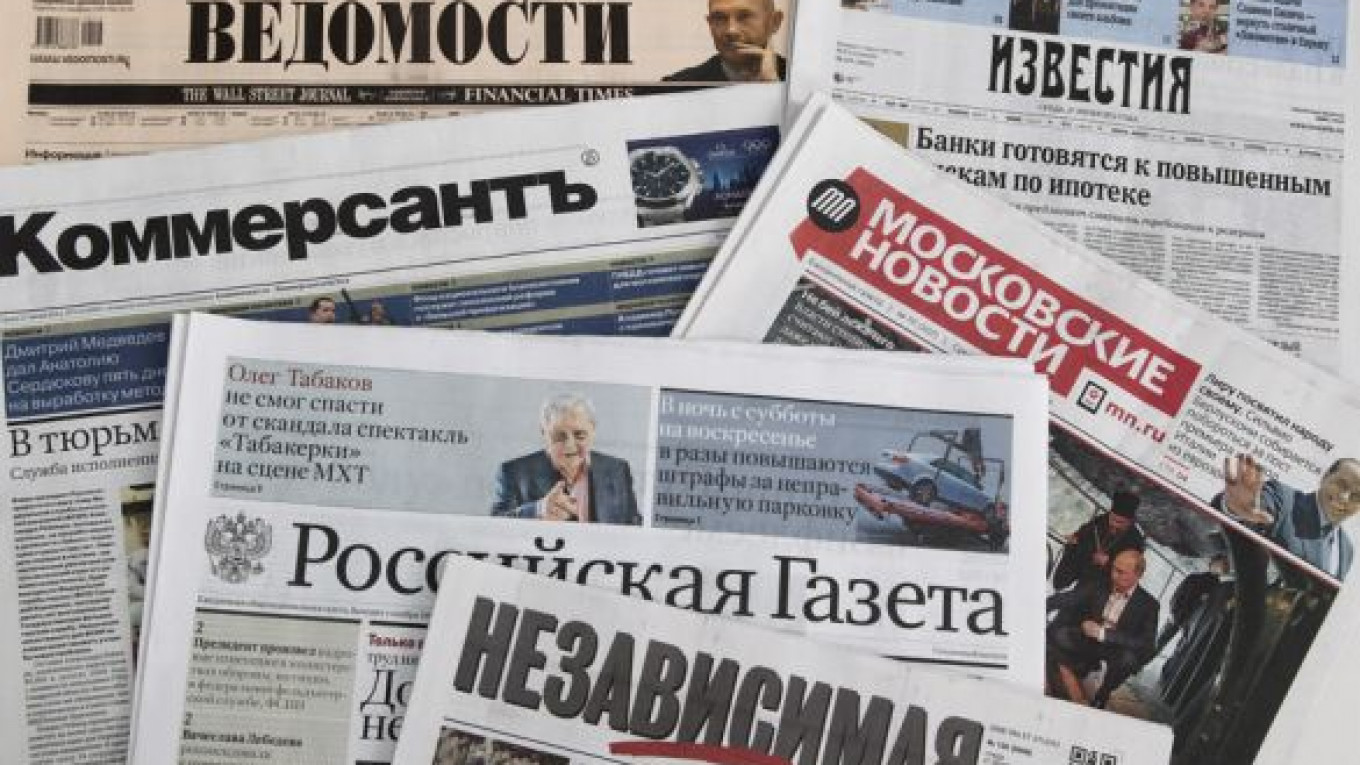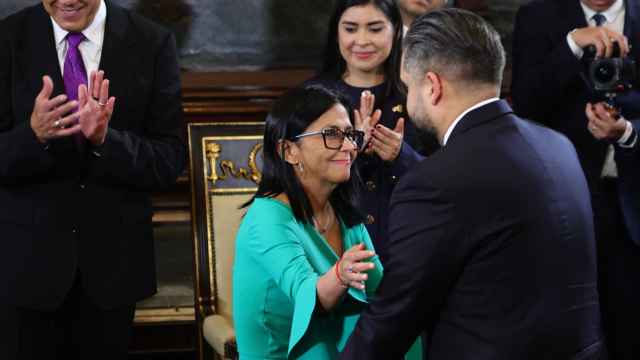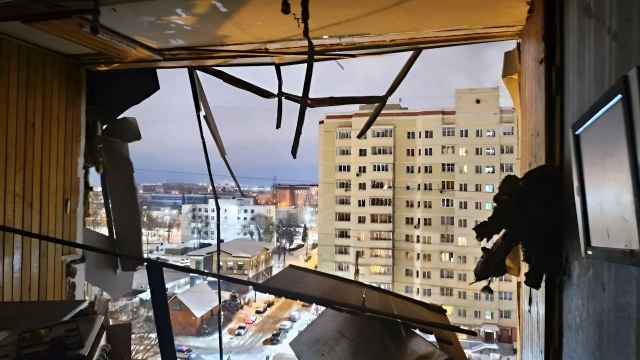Kommersant
1. Olga Shestopal and Svetlana Dementyeva article headlined "Regulator stuck at interest rate" says Russian banks have managed to lobby amendments to the bill on consumer credits which will allow them to deviate from the maximum interest rate stipulated by the Central Bank by 30 percent; p 1 (636 words).
2. Pavel Tarasenko and Maxim Yusin article headlined "Maidan presses for non-confidence vote" says the Ukrainian parliament is to vote non-confidence to the country's cabinet. President Viktor Yanukovych is expected to sacrifice his government to calm protesters down and win time; pp 1, 8 (788 words).
3. Yury Barsukov et al. report headlined "Monopolies to tighten belts twice as much" says the Kremlin and the Russian government are to step up control over expenses of monopolies. Gazprom, Transneft and Russian Railways were ordered to draft their plans to cut expenses by 10 percent; pp 1, 9 (680 words).
4. Yekaterina Gerashchenko and Ivan Kuznetsov article headlined "Supreme courts left without movement" says the Higher School of Economics is not going to get the buildings of the Supreme Court and the Supreme Arbitration Courts moving from Moscow to St. Petersburg, as it had been initially planned. The buildings will be sold to cover the expenses of the courts' relocation; pp 1, 12 (576 words).
5. Ivan Safronov article headlined "Armenia gets Russian price [for oil]" sums up the results of President Vladimir Putin's visit to Yerevan: Armenia announced its decision to join the Customs Union and Putin canceled the 35 percent duty on oil products for the country; p 2 (794 words).
6. Sergei Goryashko article headlined "Ukraine moved to fourth place" says a recent public opinion poll has shown that Russians consider Belarus, Kazakhstan and Armenia to be the main allies in the former soviet space. Ukraine was listed only the fourth. Experts attribute the attitudes to the anti-Ukrainian campaign conducted by the Russian authorities; p 2 (468 words).
7. Anna Pushkarskaya article headlined "Supreme Court reprimands legal reform" says the Supreme Court and the Supreme Arbitration Court have criticized the presidential bills on the legal reform as they violate the constitution; p 3 (918 words).
8. Irina Nagornykh and Alexander Kaykov article headlined "Kremlin veteran reaches exit" says presidential adviser Alexander Abramov who worked on the managerial positions in the Kremlin since 1999 has resigned; p 3 (512 words).
9. Sergei Mashkin article headlined "Anatoly Serdyukov has nothing to be blamed for yet" says the main investigations directorate of the Investigative Committee will question former Defense Minister Anatoly Serdyukov today, as he is suspected of negligence; p 4 (416 words).
10. Sergei Strokan article headlined "China and India splitting Moon and Mars" says the space race is moving to Asia as China announced the launch of a spacecraft to the Moon and India launched a Mars explorer device; p 7 (644 words).
11. Maria Yefimova article headlined "Persian Gulf becomes unsafe for sermon" says the Saudi Arabian and Kuwait authorities have launched a campaign against Sunni clerics. The ruling dynasties of the region are becoming increasingly concerned about the ideologist of the Arab Spring whom they have recently sponsored; p 7 (571 words).
Nezavisimaya Gazeta
1. Alexandra Samarina article headlined "Putin to announce a call-up" says the All-Russia People's Front has started forming a personnel reserve for President Putin who is to take part in the forum of the movement on Dec. 5; pp 1, 3 (810 words).
2. Svetlana Gavrilina article headlined "No-visa trap for Greenpeace" says the foreign Greenpeace activists released on bail in St. Petersburg cannot leave Russia as they entered the country illegally; pp 1 — 2 (550 words).
3. Tatyana Ivzhenko article headlined "Sergei Lavrov goes to Kiev" says the Ukrainian authorities do not believe in the effectiveness of Russian efforts as mediators in the political crisis and are speaking about the need to involve the EU in resolving the crisis; pp 1, 6 (1,360 words).
4. Anastasia Bashkatova and Mikhail Sergeyev article headlined "President left without economists' support" says economic experts are pessimistic about the Russian economy, saying it is stagnating rather than developing. President Putin receives contradictory advice from his assistants; pp 1, 4 (854 words).
5. Sergei Kulikov article headlined "Government invents stick to re-activate car market" says the Russian government is to impose special taxes on drivers using fuel of Euro-1 and Euro — 2 type. Half of the car owners in the country face paying the tax; pp 1, 4 (511 words).
6. Tatyana Dvoynova article headlined "Primorye Region to play roulette for billion" says the Primorye region administration is to invest 1 billion rubles ($30 million) in the construction of the gambling zone in the region. The company to use the money, Corporation of Primorye Region Development, is going through hard times, the local opposition note; pp 1 — 2 (627 words).
7. Editorial headlined "Power of those who lost" looks at the possible employment for United Russia deputies losing seats in elections and suggests that the U.S.-type think tanks should be set up in Russia; p 2 (517 words).
8. Oleg Nikiforov article headlined "Carte Blanche. German business for dialogue with Moscow" says German businesses advocate three party talks between the EU, Ukraine and Russia over Kiev's prospects for signing the Association Agreement with the EU; p 3 (610 words).
9. Viktoria Panfilova article headlined "Trial balloon of Emomali Rakhmon" comments on the recent appointment of Tajik President Rakhmon's son, Ruslan Emomali, as chief of the state's customs service, saying the move indicated Rakhmon's intention to make his sun his successor; p 6 (750 words).
10. Vladimir Skosyrev article headlined "Cameron becomes China's lawyer in West" says British Prime Minister David Cameron visiting China is trying to set the Tibet issue aside and improve the British-Chinese economic ties; p 7 (565 words).
11. Darya Tsilyurik article headlined "Western companies eager to come to Iranian market" says European and American companies are getting ready to return to the Iranian market as sanctions against the country are to be eased; p 7 (728 words).
Vedomosti
1. Vitaly Petlevoy article headlined "Guarantees to metal makers" says the government will assist metallurgical companies with state guarantees for their creditors and will allocate money to help them close some plants; pp 1, 12 (484 words).
2. Lilia Biryukova and Maxim Glikin article headlined "Union of former rightists" says Nikita Belykh is likely to become the first governor nominated by the Civil Platform party of billionaire Mikhail Prokhorov; pp 1 — 2 (679 words).
3. Editorial headlined "President's weapon" says the recent meetings held by president Putin on the military industrial sector show that the systemic problems with the Armed Forces rearmament have not been resolved. Russian manufacturers are less efficient and they lack new technologies available abroad; pp 1, 6 (365 words).
4. Alexei Nikolsky article headlined "Government currently unavailable" says that the government may become "the first victim" of the Ukrainian crisis, as the protesters block its work; however, even if the whole government resigns, it is unlikely to resolve the issues between the opposition and the authorities; p 2 (500 words).
5. Maria Zheleznova article headlined "Cheap gas instead of Europe" comments on the decision of Armenia to join the Customs Union in return for favourable prices on oil; p 3 (500 words).
6. Vladimir Fedorin article headlined "Why Yanukovych failed" says the political crisis in Ukraine has proven that the populist policy of Viktor Yanukovych does not convince the electorate; p 6 (1,026 words).
7. Another editorial headlined "Customs empire" says the Customs Union is not an economic project for Russia, but a political and even imperialistic one. Moscow will pay the price of other countries joining the union; p 6 (327 words).
8. Maxim Tovkaylo and Galina Starinskaya article headlined "Forty-one percent to be cut off monopolies" says that the government has demanded that Gazprom, Transneft, Russian Railway and Rosseti cut their spending by 10 percent every year during the upcoming 5-year period; p 10 (500 words).
Izvestia
1. Pavel Kochegarov article headlined "Audit Chamber finds violations in production sharing filed" says the Audit Chamber has found violations in the implementation of production sharing agreements. It turned out that a large number of foreign contractors work for Russian companies extracting hydrocarbons; pp 1, 3 (550 words).
2. Svetlana Subbotina article headlined "All-Russia People's Front to call Magomedov and Slyunyayeva to discuss nationalities issue" says the All-Russia People's Front is going to discuss the nationalities issue at the top level with the involvement of ministers and the presidential administration officials; pp 1 — 2 (400 words).
3. Dmitry Runkevich and Yelena Malay article headlined "Contemporary version of Koran to appear in Russia" says the deputy chairman of the Russian mufti council, Rushan Abbayasov, has suggested that a Koran version using modern Russian language should be published; pp 1, 3 (600 words).
4. Lyudmila Podobedova article headlined "Extraction of shale gas may begin in the Zabaikalsky Region" says Rosneft and Gazprom have reached an agreement with the Zabaikalsky Region authorities to provide the region with energy; pp 1, 4 (600 words).
5. Alena Sivkova article headlined "Budget to be filled with beer" says that the State Duma intends to toughen the anti-alcohol policy in the country by drafting a bill that will dramatically raise the price on beer; pp 1, 3 (500 words).
6. Yelizaveta Mayetnaya and German Petelin article headlined "Yet another Oboronservis case suspects may be set free" says that former director-general of the Slavyanka company, Alexander Yelkin, who has been under arrest for over a year on suspicion of fraud, may be set free as the investigation failed to finish investigative procedures in time; pp 1, 4 (800 words).
7. Yelena Malai et al. article headlined "Alexander Plutnik, Vladimir Tokarev and Yury Reilyan become deputy ministers of Construction, Housing and Utilities" looks into new appointments in the recently-established ministry; p 2 (600 words).
8. Alexei Krivoruchek article headlined "Sergei Shoigu starts fight against bioterrorism" says the Defense Ministry plans to create a device for tracking and analyzing causative agents of infectious diseases; p 3 (400 words).
9. Yury Matsarsky and Vladimir Suvorov article headlined "Kiev 'street' indifferent to Premiere's destiny" features a report on the latest developments around street protests in Ukraine; p 7 (600 words).
10. Mikhail Vignansky article headlined "Mikheil Saakashvili suspected of returning ratings with help of maidan" says that the ruling Georgian party has been displeased to hear that former Georgian president Mikheil Saakashvili has allegedly arrived in Kiev to support the opposition; p 7 (700 words).
Rossiiskaya Gazeta
1. Taras Fomchenkov et al. report headlined "Ruble wehee!" says experts predict that dollar and euro exchange rate are to fluctuate in relation to rouble by 3 — 4 rubles; pp 1, 5 (650 words).
2. Yevgeny Shestakov article headlined "Polish 'strike' at Kiev" says the EU has made a mistake when entrusted Poland with developing the association agreement with Ukraine as the two countries have the history of hostile relations; pp 1, 9 (1,200 words).
3. Vladislav Kulikov article headlined "Pre-paid fine" says the anti-corruption legislation can be amended to make officials charged with bribery and sentenced to fines pay deposits before their verdicts are passed, as at present many officials get away without paying fines; pp 1, 11 (800 words).
4. Maxim Novikov article headlined "Kievskaya. Next station is Barrikadnaya [Rus. for Barricade]" reviews President Vladimir Putin's reaction to the recent events in Ukraine and notes that Putin said the rioting in Ukraine had been planned well in advance; p 9 (1,000 words).
Moskovsky Komsomolets
1. Oleg Bazak article headlined "In the name of eurolution" says the Ukrainian pro-European opposition demand the government's resignation. They claim they did not hire pogrom-makers for their rallies; pp 1, 3 (745 words).
2. Bogdan Zvarish article headlined "Ruble weakening to continue" says ruble will continue losing its value in 2014, despite high oil prices; pp 1 — 2 (539 words).
3. Mikhail Zubov article headlined "Kremlin fed up with pluralism" looks into the report on the Russian party system presented by the Civil Society Development Foundation, saying that the number of political parties in Russia is likely to decrease. As the foundation belongs to the presidential administration, those are not just guesses, the article says; p 2 (200 words).
4. Alexander Melman article headlined "Faeces TV movement" slams federal television channels for the failure to cover the opposition protest in Kiev and clashes between the opposition and the law-enforcement agencies; p 3 (625 words).
5. Igor Karmazin article headlined "Who is on duty at Maidan?" says that students and nationalists are the backbone of the Kiev riots; p 3 (250 words).
6. Pundit Stanislav Belkovsky article headlined "Maidan of inevitability" says that Ukraine will aim at integration with the EU as no strategic partnership is possible between Ukraine and present-day "kleptocratic" Russia; p 3 (800 words).
RBC Daily
1. Yulia Sinyayeva et al. report "Tripartite Maidan" says that protests continue in Ukraine after talks on the European integration have been suspended. The buildings of the Cabinet of Ministers and National Bank are blocked. President Viktor Yanukovych asked the European Commission to hold talks with a Ukrainian delegation to discuss the association agreement, but Russia also wants to take part in the negotiations; pp 1-2 (1,400 words).
2. Alexander Litoy report "Nice, like on Bolotnaya square" features Russian human rights activists' impressions of the Euro-Maidan, the supporters of Ukraine's European integration who camp on Kiev's Independence Square; p 2 (550 words).
3. Yevgeny Novikov report "Government's faffing about" says that Prime Minister Dmitry Medvedev has summed up the interim results of the implementation of Putin's May decrees; p 3 (600 words).
Noviye Izvestia
1. Yana Sergeyeva report "Square rules" says that the Ukrainian government may resign because of protests in Kiev. The parliament will hold a no confidence vote in the government today; pp 1-2 (650 words).
2. Yekaterina Dyatlovskaya report "Outsiders' league" says that pro-Kremlin political strategists have drafted a new filter for political parties. They suggest that all political parties should be divided into three leagues and in accordance with this division, restrictions should be introduced for the parties' participation in federal and regional elections; p 2 (800 words).
3. Sergei Putilov report "Liquefaction of export" says that the Russian gas giant Gazprom has been deprived of monopoly on gas export; p 3 (400 words).
Komsomolskaya Pravda
1. Vladimir Vorsobin report "Will Ukraine go through Maidan peacefully?" looks at protests in Ukraine and says that both President Viktor Yanukovych and revolutionaries are in a trap and no-one has routes of escape; pp 1, 3 (1,400 words).
2. Dmitry Smirnov report "'It is not revolution, but rioting'" quotes Putin's statements on the events in Ukraine that he has made at a news conference in Armenia; p 2 (700 words).
3. Andrei Ryabtsev report "Virtual revolution" looks at protests in Ukraine and says that there are two Euro-Maidans in the country: the one is real and the second is virtual, as seen by supporters of Ukraine's European integration; p 4 (450 words).
4. Miroslava Bzikadze report "Three regions declare strike" says that three regions in Ukraine have declared general indefinite strike as from Dec. 2; p 4 (300 words).
5. Yevgenia Suprycheva report "Damned days" looks at protests in Ukraine and says that what is happening in Kiev resembles a nightmare; p 5 (1,400 words).
6. Article by political analyst Sergei Markov "December theses" analyzes the situation in Ukraine; p 6 (450 words).
7. Yegor Kholmogorov report "Poland and Lithuania already dream about new toadies" says that Polish politician Jaroslaw Kaczynski has visited the Maidan in Kiev "in order to push Ukraine, together with the leaders of the local opposition, into the EU in every way possible"; p 7 (1,700 words).
8. Viktor Baranets report "Army to become three-quarter contract-based" says that by 2020, 500,000 contract soldiers will serve in the Armed Forces; p 10 (700 words).
9. Unattributed interview headlined "Did Cold War between Russia and U.S. ever end?" with pro-Kremlin pundit Veronika Krasheninnikova says that American politicians and special services continue acting in the way as if ideological confrontation between the two super powers never stopped; p 15 (1,800 words).
Trud
1. Sergei Ilchenko report "Wild dance in Kiev" looks at protests in Kiev and features Russian analysts' comments on the situation in Ukraine; pp 1-2 (1,700 words).
Krasnaya Zvezda
1. Ivan Mikhaylov report "Kiev on Euro-Maidan" looks at protests in Ukraine; p 3 (650 words).
2. Viktor Ruchkin report "Terrorist threat spreads in world" looks at the situation in Syria and says that hostilities continue in the country; p 3 (750 words).
Tvoy Den
1. Anton Stepanov report "Battle on Dnieper" looks at the situation in Kiev and says that the opposition has seized the Kiev mayor's office and blocked the building of the government; pp 2-3 (500 words).
A Message from The Moscow Times:
Dear readers,
We are facing unprecedented challenges. Russia's Prosecutor General's Office has designated The Moscow Times as an "undesirable" organization, criminalizing our work and putting our staff at risk of prosecution. This follows our earlier unjust labeling as a "foreign agent."
These actions are direct attempts to silence independent journalism in Russia. The authorities claim our work "discredits the decisions of the Russian leadership." We see things differently: we strive to provide accurate, unbiased reporting on Russia.
We, the journalists of The Moscow Times, refuse to be silenced. But to continue our work, we need your help.
Your support, no matter how small, makes a world of difference. If you can, please support us monthly starting from just $2. It's quick to set up, and every contribution makes a significant impact.
By supporting The Moscow Times, you're defending open, independent journalism in the face of repression. Thank you for standing with us.
Remind me later.






